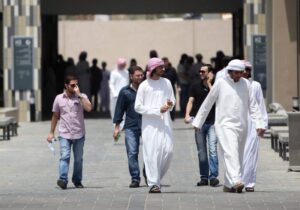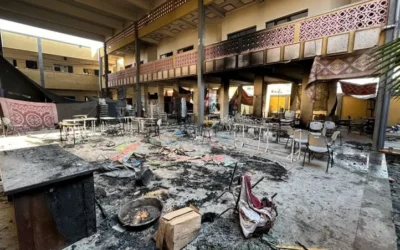Arab youth unemployment is staggering – but there is a way forward
Author: Danah Dajani
Publication: The National
With more than 65 per cent of people in the region being under the age of 30, according to the last year’s Arab Barometer survey, it is home to one of the world’s largest youth populations. Unfortunately, in 2022, a staggering one third of 15 to 24-year-olds not involved in education or training found themselves jobless, exceeding the global average by 10 per cent.
Despite this disheartening reality and these sobering statistics, young Arabs remain hopeful. The 2022 Arab Youth Survey revealed their belief in more-promising times ahead, anticipating a better life than their parents. They remain optimistic even as they acknowledge the trials, and in some cases, the decline, of their national economies.
So, how can we harness this hope and potential to address the Arab youth-unemployment challenge? The answer lies in leveraging education and training to pave the way for a prosperous future.
Current policy discussions regarding unemployment among young Arabs mainly focus on creating work opportunities, promoting economic development, fostering entrepreneurship and empowering youth. These are undoubtedly important factors that must be addressed. However, it is equally important to recognise the power of education and training in creating more prosperous futures for these young minds. Interestingly, young people themselves recognise this, leading them to be remain optimistic about their prospects.

When asked about their aspirations for the next 10 years, Arab youth gave finishing their education and establishing a successful career as their top priorities. Given that young people are wilfully optimistic and eager to learn and work, it is incumbent on society to provide the necessary pathways and opportunities for them. There are several key elements to consider.
Firstly, technology can revolutionise education, making it accessible, personalised and engaging. Imagine a world where every young person has access to first-class education and training right at their fingertips. Fortunately, in the Mena region, there are several initiatives aimed at supporting this evolution in education.
The TechUp programme, for example, attempts to bridge the digital skills gap that exists between education and the industry’s talent needs by leveraging a “train to hire” framework to develop local human capital for a competitive economy. This programme was launched by the Abdulla Al Ghurair Foundation in collaboration with the private sector to create a pool of talented and job-ready professionals in the region using a fully online platform for learning from Udacity, a US-based education organisation.
Secondly, the future of work demands practical skills and adaptability. This means education must align with the job market’s needs, equipping graduates with technical and transferable skills essential for industries like artificial intelligence and renewable energy. Educational institutions must go beyond merely ensuring that students have foundational habits and focus on preparing them for the jobs of the future.
In today’s fast-paced world, continuous learning is key to remaining relevant and adaptable
It has always been this way, but now, everyone knows it — degrees are no longer the endpoint of education. A degree may show that you have the grit, stamina and discipline to learn and deliver on that knowledge in a structured and timely manner. In other words, you have the foundations of a professional mindset.
However, in today’s fast-paced world, continuous learning is key to remaining relevant and adaptable, knowing that the half-life of new skills has been declining over the past decade. It is important to develop a culture of lifelong learning that allows everyone to progress and advance in their careers, fostering a growth mindset that encourages those who might otherwise feel intimidated by what they do not know.
Global partnerships are vital for growth. The evolution of learning requires enhancing authentic collaborations with institutions across all sectors worldwide. Education should be integrated with businesses, governments, philanthropies, research and development centres, think tanks and more.
By purposefully creating a strong international network that promotes innovation and growth, learners and countries alike can benefit significantly. Together, we can build a more prosperous future not just for the Middle East, but for the world.
Educated, skilled women are also catalysts for economic development. By ensuring equal access to education and training, the region can tap into its full talent pool and drive sustainable growth. According to PricewaterhouseCoopers, increasing the number of women who are employed in the Mena region could increase its gross domestic product by up to $2 trillion. This demonstrates, once again, that genuine inclusion of all members of society benefits everyone.
It is crucial to prioritise education and training for women, especially given that literacy varies within the region. While Jordan and the UAE have above 95 per cent literacy, according to research presented to the US Congress in 2021, Yemen’s literacy rate is 55 per cent and Egypt’s is at 65 per cent.
Supporting this vulnerable yet important group requires careful consideration, as the benefits of doing so are impressive.
Investing in education and training that pave the way for opportunities must be the primary focus in finding solutions for both economic empowerment and national development in the region.
Young Arabs recognise their own potential; they are focused on completing their education and training to establish successful careers. Let us work together to transform the region’s youth bulge into a tidal wave of opportunity towards a brighter future for generations to come.



